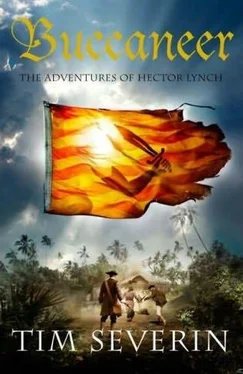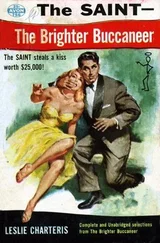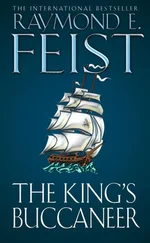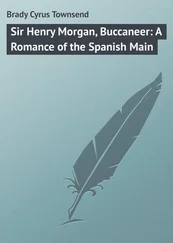Yet the atmosphere continued to be very sour and unhappy. The crew grumbled about the lack of plunder. The sack of La Serena had yielded barely 500 pounds' weight of silver to be divided between nearly 140 men. They felt this was a paltry sum for all the risks they had taken, and it made matters worse that many of the malcontents had gambled away their booty in the long, dull sea days that followed. By the time they reached Juan Fernandez, a majority of the dice and card players were virtually penniless, and they muttered darkly that they had been swindled. When they did so, they looked towards Captain Sharpe. Unable to prove it, they were sure that he had somehow gulled them.
To leave behind the bickering and the acrimony of the camp, Hector had got into the habit of going for a long walk each day. From the pleasant glen where the sailors had set up their shelters, a narrow goat track climbed steeply inland, leaving behind the groves of sandalwood and stands of pimento trees and passing up through dense thickets of brush. The path doubled back and forth, and after the long weeks spent on board ship he found that his legs were quickly tired by the demands of the steep ascent. Now his leg muscles were aching, and it would take him another hour of hard climbing to reach the crest of the narrow ridge where he liked to spend a few moments looking out over the ocean, quietly contemplating. This morning he needed to hurry because there was to be a general council of the expedition at noon, and he wanted to be back in time to attend. The men were to vote whether Bartholomew Sharpe was to continue as their general and — equally important — what was to happen when Trinity left the island.
Hector took deep breaths as he scrambled upward. In places the bushes grew so close together that he had to force his way through, the branches snagging at his clothes. Occasionally he caught the distinctive acrid smell of goat hanging in the air, and once he startled a small herd, three billies and as many she-goats, which ran up the path ahead of him with their odd mincing stride, before plunging aside into the thickets and disappearing. As he ascended, the sounds of the seal colonies grew fainter and fainter from below, and whenever he stopped to turn and look down into the bay, Trinity looked increasingly small and insignificant until finally a turn in the path meant that he could no longer see the ship at all. From now on he might as well have been alone in the entire world. To his left rose a mist-shrouded mountain, a gloomy square mass with the shape of a gigantic anvil. On his right the island was a densely forested jumble of ravines and cliffs and spurs and ridges which were impenetrable to anyone except an expert hunter.
Eventually he reached his destination, the narrow saddle of the ridge joining the anvil mountain to the wilderness, and sat down to rest. The crest of the ridge was no more than a yard or two in breadth and the view to either side was magnificent. Ahead of him the ground dropped away in sheer scree and he was looking out over a wave-flecked ocean which spread out to a horizon of cobalt blue. When he turned in the opposite direction, he was facing into the sun and the surface of the sea became an enormous glittering silver sheet across which drifted dark shadows cast by the clouds. Everything seemed far, far away, and the high ridge was exposed to a wind which rushed past, swirling over the crest of land.
He sat in the lee of a great flat rock, clasped his arms around his knees, and gazed out to sea, trying to think of nothing, losing himself in the vastness of the great panorama before him.
He must have been sitting silently for five or ten minutes when he became aware of an occasional small black speck which sped past him, flitting through the air. To begin with, he thought the specks were a trick of his vision, and he blinked, then rubbed his eyes. But the phenomenon continued, momentary glimpses of some tiny flying object which came up from the scree slope behind him, moving so fast that it was impossible to identify, then vanished ahead, dipping down the slope in front of him. He concentrated his gaze on a clump of bushes a few paces below where he sat. That's where the flying specks seemed to disappear. Cautiously he eased himself off the ridge and, still seated, slid down towards the bush. There was a slight brushing sensation on his cheek as another of the little specks flew past, so close that he distinctly felt the wind of its passage. It vanished so quickly that he still could not identify what it was. He suspected it was some sort of flying insect, perhaps a grasshopper or a locust. He came to within an arm's length of the bush, and waited motionless. Sure enough, there was a quick darting movement as another of the flying specks came up from behind him, slowed in mid-air for an instant, then plunged in among the branches. Now he knew what it was: a tiny bird, no bigger than his thumb.
Another few moments passed, and then one of the diminutive creatures rose from within the bush. It ascended vertically and began to hover in the air, its wings moving in a blur. The bird was no more substantial than a large bumblebee and astonishingly beautiful. The feathers were green, white and brilliant blue. A moment later it was joined by a companion rising from the foliage. This time the plumage was a glossy dark maroon, the colour of drying blood, which glowed in the sunshine. A few heartbeats later and the two tiny creatures began to dance together in the air, circling and dipping, hovering to face one another for a few moments, then suddenly diving and turning and making short arcs and loops until they came together again and stayed hovering. Spellbound, Hector watched. He was sure that the two birds were male and female and they were performing a mating dance.
With a sudden pang of memory he recalled the last time he had seen a hummingbird. It had been just over a year ago with Susanna when they were travelling towards Port Royal and she had said he possessed the soul of an artist because he had compared the whirring sound made by the wings to the noise of a miniature spinning wheel. Now he listened carefully to the two birds dancing in the air before him. But he could hear nothing above the sound of the wind sighing over the ridge. An image of Susanna came to mind with painful clarity. He saw her dressed in a long, resplendent gown and attending a grand occasion in London where she had been taken by her father. She was dancing with her partner before a crowd of onlookers, all of them wealthy and sophisticated and of her own social standing. With an effort Hector tried to push the apparition out of his mind. He told himself that he was seated on a mountainside on the far side of the world, and this image of Susanna was entirely make-believe. He scarcely knew her. It did not matter what happened in the next months or years, whether he stayed with Trinity and her crew, whether he returned with riches or in poverty. Susanna was always going to be unattainable. His encounter with her would never be more than a chance meeting, however much it had affected him. He should learn from his moment of confusion when he had stood before the portrait of a young lady in La Serena and found himself uncertain of what exactly reminded him of Susanna. As more time passed, he would remember less and less of the true Susanna and what had happened during those few hours he had spent in her company. Instead he would substitute fantasy until everything about Susanna was make-believe. It was an irreversible process and his best course was to free himself of false hope. It was time he acknowledged that he was keeping alive an illusion that had no place in the true circumstances of his own life.
He shivered. A cloud had passed across the sun and the wind brought a momentary chill in the shadow. Robbed of sunlight, the plumage of the two dancing hummingbirds abruptly lost its irridescence and, as if sensing the change in his mood, they darted back into the foliage. Hector got to his feet and began to descend the path back to camp.
Читать дальше








